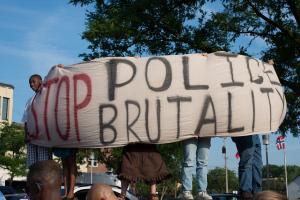
Capital punishment, the state-sanctioned execution of a criminal after they have been convicted of a crime, runs contrary to the dignity of life. If we can and should recognize then, Pope Francis tells us that we should also reject the lethal use of force by law enforcement agents (police), when such actions are unjustifiable (such as when a suspect has already been apprehended, or when the suspect offers no viable threat to the arresting officer):
It can be established, however, that States take life not only through the death penalty and through war, but also when, in order to justify their crimes, public officials take refuge in the shadow of State prerogatives. So-called extra-judicial or extra-legal executions are homicides deliberately committed by certain States and by their agents, often passed off as clashes with criminals or presented as the unintended consequences of the reasonable, necessary and proportionate use of force in applying the law. In this way, although among the 60 Countries that sanction the death penalty, 35 have not applied it in the last 10 years, the death penalty is applied illegally and in varying degrees throughout the planet.
The same extra-judicial executions are performed in a systematic way not only by States in the international community, but also by entities not recognized as such, and they are genuine crimes.[1]
Pope Francis does not say that the use of deadly force is always unjustifiable, but that it is often claimed to be justified when it is not warranted, and when it is used unjustly, then it should be considered as criminal homicide. If the state should not execute a criminal, then police officers should not arbitrarily kill or even harm suspects. They should do what they can to take the suspect alive (and unharmed). Only if there is an immediate, dire threat, could the use of deadly force be seen as justified, but if the threat is not there, the use of deadly force must not be seen as acceptable. Even if the use of deadly force was not deliberate, but was accidental, if the situation did not justify such a use of force, the police officer must be held culpable for what they have done, similar to the way anyone else is held culpable for similar negligence.
Law enforcement officials must be expected to protect the dignity of all, including and especially suspects; those who are unconcerned, or worse, laugh at such expectations have no business being involved with law enforcement, because it is clear, their concern is not for justice. Indeed, as the state should be promoting the dignity of the human person in and through their legal system, police must be on board with this principle and keep to it in all that they should do:
In the application of punishment, caution must be the underlying principle of criminal law systems, and the full operative force of the pro homine principle must guarantee that States are not allowed, juridically or in fact, to subordinate respect for the dignity of the human person to any other purpose, even should it serve some sort of social utility. Respect for human dignity must serve not only to limit arbitrariness and the excesses of the agents of the State, but act as a guiding criterion for the prosecution and punishment of those actions which represent the most serious attacks against the dignity and integrity of the human person. [2]
If law enforcement agents do not treat people with equal dignity, they undermine the basis of a just society. When there is systematic racism involved in the way suspects are mistreated, so that those of particular races tend to be abused and unjustly killed in a higher proportion to other races, this means the justice system has failed its duty and needs to be radically transformed. Racism is unacceptable. Turning a blind eye to it only reifies systematic structures of sin, undermining the value and dignity of the human person. Thus, Pope Francis said, we must never ignore racism and its impact on society: “My friends, we cannot tolerate or turn a blind eye to racism and exclusion in any form and yet claim to defend the sacredness of every human life.” [3] When society ignores racism, when it allows for or reinforces systematic racism, the injustices promoted by that society will cry up to heaven until at last, it is either put to an end and restitution is made, or that society will have to face the dreadful consequences of its sin.
Police reform is necessary. Police must be held responsible for what they do. Show trials which deal with individual instances of abuse are not enough. Even if the trials actually convicted officers and gave them a just sentence for their crime, for every show trial there are many more instances of abuse which are ignored. Such trials are often used as scapegoats, convicting lone officers instead of dealing with how and why they did what they did. When we see case after case after case where police use deadly force, so that we are not even finished with one show trial before another police shooting happens, it is clear, the system is broke. The system must be replaced. Justice must prevail, and those who serve as enforcers of justice must accept the authority they have means they have a greater responsibility to the public and should be held more accountable if they do wrong. If we want to support the law, we cannot accept police misconduct. Those who materially aid and abet law enforcement officials in acts of injustice must be treated as accomplices and dealt with accordingly. Justice must begin with those who enforce it, or else, they will not be enforcers of justice, but rather thugs in uniform.
Society must reflect and promote the dignity of the human person. It must protect the life of everyone, including those who are being charged for a crime. Not only must the death penalty be rejected, we must reject the unjust use of force by those who are in positions of power and authority. If we do not, then our legal system, and its enforcement, must be rejected and a new one put in place.
[1] Pope Francis, “To the Delegates of the International Association of Penal Law” (10-23-2014).
[2] Pope Francis, “To the Delegates of the International Association of Penal Law” (10-23-2014).
[3] Pope Francis, “General Audience” (6-3-2020).
Stay in touch! Like A Little Bit of Nothing on Facebook.
If you liked what you read, please consider sharing it with your friends and family!













